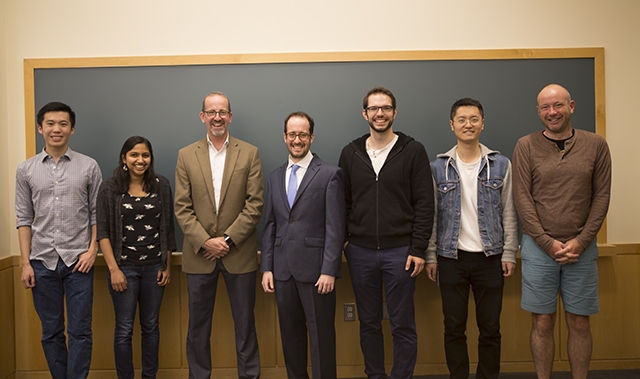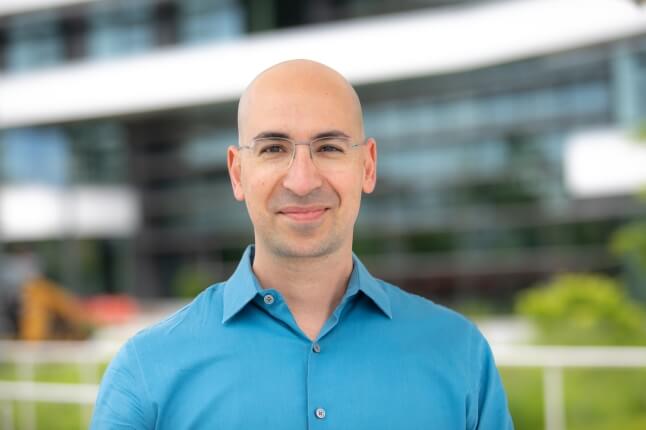News
Five SEAS graduate students have been named Siebel Scholars. From left: Alexander Wei, Meena Jagadeesan, Dean Frank Doyle, Marcus Comiter, Sebastian Gehrmann, Yuliang Li, and Eddie Kohler, Area Chair for Computer Science. (Photo by Adam Zewe/SEAS Communications)
Five computer science graduate students at the Harvard John A. Paulson School of Engineering and Applied Sciences (SEAS) have been named 2020 Siebel Scholars.
Marcus Comiter, Sebastian Gehrmann, Meena Jagadeesan, Yuliang Li, and Alexander Wei will each receive a $35,000 award for their final year of graduate studies.
They are among 93 students who join past Siebel Scholars classes to form a professional network of more than 1,400 scholars, researchers, and entrepreneurs. Through the program, this group brings together diverse perspectives from business, science, and engineering to influence the technologies, policies, and economic and social decisions that shape the future.
“Every year, the Siebel Scholars continue to impress me with their commitment to academics and influencing future society. This year’s class is exceptional, and once again represents the best and brightest minds from around the globe who are advancing innovations in healthcare, artificial intelligence, the environment and more,” said Thomas M. Siebel, chairman of the Siebel Scholars Foundation. “It is my distinct pleasure to welcome these students into this ever-growing, lifelong community, and I personally look forward to seeing their impact and contributions unfold.”
Established in 2000 by the Thomas and Stacey Siebel Foundation, the Siebel Scholars program awards grants to 16 universities in the United States, China, France, Italy, and Japan. Following a competitive review process by the deans of their respective schools on the basis of outstanding academic achievement and demonstrated leadership, the top graduate students from 27 partner programs are selected each year. On average, Siebel Scholars rank in the top 5 percent of their class, many within the top 1 percent.
Student Biographies
Marcus Comiter is a computer science Ph.D. candidate advised by H.T. Kung, William H. Gates Professor of Computer Science and Electrical Engineering. His research focuses on 5G wireless networking, machine learning, cybersecurity, and technology public policy. His latest work has centered on developing new cybersecurity methods to secure machine learning against emerging threats, and has developed methods to allow secure deep neural network inference on untrusted devices. His wireless research developed new machine learning techniques for beam steering in millimeter wave networks. Comiter is also a non-resident fellow at the Belfer Center for Science and International Affairs, where his public policy research addresses cybersecurity, AI, supply chain security, and data privacy, and has been featured in the Washington Post. He has won multiple awards as a teaching fellow, and serves as a resident tutor in Kirkland House, where he is head of fellowships advising and an advisor in computer science. He graduated from Harvard magna cum laude with highest honors in 2015, with a joint concentration in computer science and statistics.
Sebastian Gehrmann is a computer science Ph.D. candidate advised by Barbara Grosz, Higgins Research Professor of Natural Sciences, and Alexander Sasha Rush, Associate in Computer Science. His research focuses on the development and evaluation of controllable and interpretable models for language generation. By applying methods from human-computer interaction and visualization to problems in natural language processing, he develops interactive interfaces that help with the interpretation and explanation of neural networks. His research has been published at the Association for Computational Linguistics (ACL) conference, North American Chapter of the Association for Computational Linguistics conference, the Conference on Empirical Methods in Natural Language Processing, the Conference on Human Factors in Computing Systems, and the IEEE Visualization Conference. An Adobe Research Fellow, his work on interactive visualization tools received an honorable mention at the 2018 IEEE Conference on Visual Analytics Science and Technology and was nominated for the ACL best demo of 2019. He is a member of the organizing committee for the 2019 International Conference on Natural Language Generation. He earned his industrial engineering undergraduate degree from Nordakademie University of Applied Sciences in 2015.
Meena Jagadeesan is pursuing an A.B./S.M. in computer science and mathematics. She is broadly interested in research in theoretical computer science and systems. In December, she will give an oral presentation of her work on dimensionality reduction at the 33rd annual Conference on Neural Information Processing Systems. Jagadeesan has received recognition for her research from the Goldwater Foundation, the Intel Science Talent Search, and the Davidson Foundation.
Yuliang Li is a computer science Ph.D. candidate, advised by Minlan Yu, Associate Professor of Computer Science. His research seeks to solve problems in the cloud, where rapid growth raises the bar for performance, reliability, and security to an unprecedentedly high level. Unlike traditional system design, Li’s research codesigns the network stack, the physical network, and the controller, leveraging their respective strengths to collaboratively solve the challenges. He utilizes the emerging programmability in new hardware devices to provide new functionalities that were previously impossible. Li designed a cloud network monitoring system that is the first to provide millisecond-scale and accurate per-flow measurement; a network stack replay system that provides instruction-level diagnostic detail with only 2 percent overhead of state-of-the-art packet logging; and a transport system that reduces latency by 95 percent when compared to other solutions. These systems are widely used by industrial and academic communities, and some are deployed in production clouds. He earned his undergraduate degree in computer engineering from Tsinghua University in 2014.
Alexander Wei is pursuing a joint A.B./S.M. degree in computer science and mathematics. His research interests broadly lie in theoretical computer science. Wei received the 2019 Symposium on Discreet Algorithms Best Student Paper award for his development of more efficient Las Vegas algorithms for approximate near neighbor search. Outside of research, Wei has interned at Google and the D. E. Shaw group. He is also a Goldwater Scholar and a gold medalist in the International Olympiad in Informatics.
About Siebel Scholars
The Siebel Scholars program was founded in 2000 by the Siebel Foundation to recognize the most talented students at the world’s leading graduate schools of business, computer science, bioengineering, and energy science. These include: Carnegie Mellon University; École Polytechnique; Harvard University; Johns Hopkins University; Massachusetts Institute of Technology; Northwestern University; Politecnico di Torino; Princeton University; Stanford University; Tsinghua University; University of California, Berkeley; University of California, San Diego; University of Chicago; University of Illinois at Urbana-Champaign; University of Pennsylvania; and University of Tokyo. Today, the active community of over 1,300 leaders serves as advisors to the Siebel Foundation and works collaboratively to find solutions to society’s most pressing problems.
To date, Siebel Scholars have driven innovations in over a dozen industries, launched more than 1,100 products, authored more than 370 patents, published nearly 40 books and more than 2,650 articles or book chapters, and managed more than $2.7 trillion in assets. As leaders of some of today’s most preeminent start-ups, nonprofits, and research institutions, Siebel Scholars have served on more than 340 boards, established more than 50 philanthropic initiatives, and founded more than 150 companies—of which more than 56 have successfully gone public or were sold to enterprises including Google, Intuit, Match.com, and Dropbox.
About the Siebel Foundation
The Thomas and Stacey Siebel Foundation, a nonprofit, public benefit corporation, was established as a private foundation in 1996. Its mission is to foster programs and organizations that improve the quality of life, environment, and education of its community members. The Siebel Foundation funds projects to support the homeless and underprivileged, education and research, public health, and alternative energy solutions.
Topics: Computer Science
Cutting-edge science delivered direct to your inbox.
Join the Harvard SEAS mailing list.
Press Contact
Adam Zewe | 617-496-5878 | azewe@seas.harvard.edu



